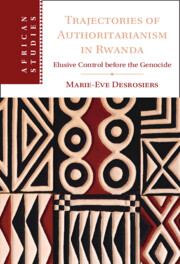
- Cited by 2
-
Cited byCrossref Citations
This Book has been cited by the following publications. This list is generated based on data provided by Crossref.
Desrosiers, Marie-Eve and Mahé, Anne-Laure 2024. The Mediation of Autocratic Regimes: How Local Officials Shaped Authoritarian Systems in Rwanda and Sudan. African Studies Review, Vol. 67, Issue. 1, p. 129.
2024. Black Soldiers in the Rhodesian Army. p. 283.
- Publisher:
- Cambridge University Press
- Online publication date:
- January 2023
- Print publication year:
- 2023
- Online ISBN:
- 9781009224741
- Subjects:
- Area Studies, African Studies, Politics and International Relations, African Government, Politics and Policy, African History
- Series:
- African Studies (161)


